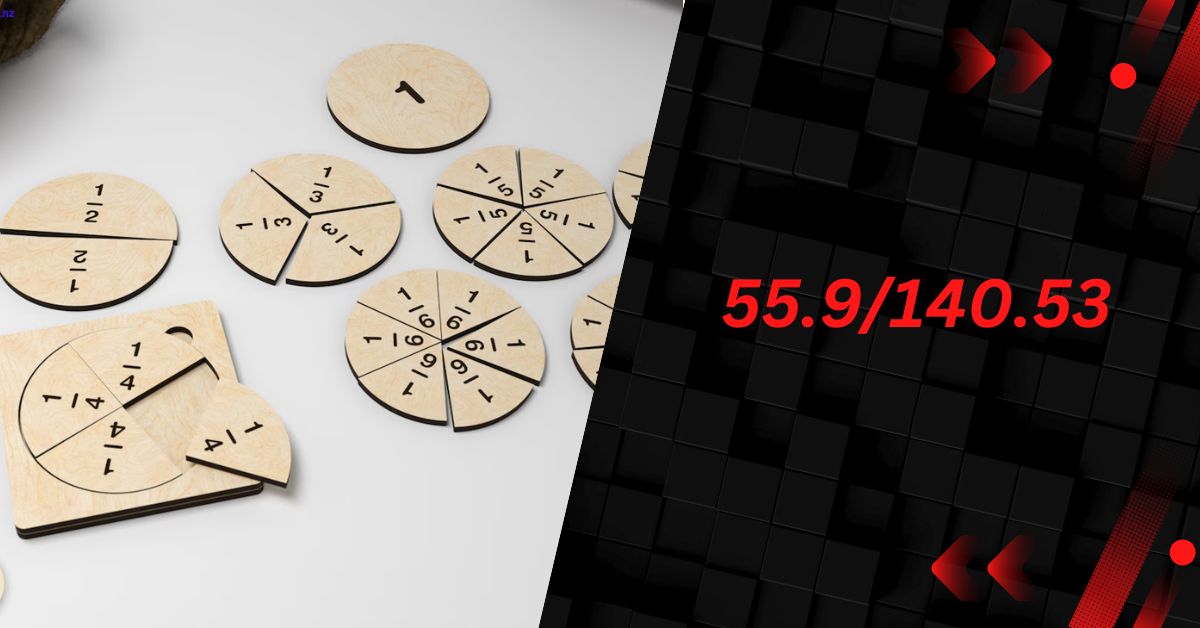Understanding the Significance of “55.9/140.53”
When faced with the fraction 55.9/140.53, it may appear as a simple mathematical expression. However, its relevance extends far beyond basic calculations.
This fraction finds applicability in numerous fields, including scientific research, financial analysis, and education, offering critical insights and helping with informed decision-making. In this article, we will explore 55.9/140.53 in detail, covering its mathematical, practical, and contextual uses.
What is 55.9/140.53?
The expression 55.9/140.53 represents a fraction where 55.9 is the numerator, and 140.53 is the denominator. In mathematical terms, this fraction can be used to show a ratio or relationship between two quantities. By simplifying or converting it into a decimal, percentage, or proportion, it can be interpreted in various real-world contexts, such as:
- Scientific Research: Used to compare measurements or analyze experimental results.
- Financial Analysis: Helps assess ratios, percentages, or rates, such as interest rates or investment returns.
- Educational Purposes: Utilized to explain fractions, ratios, and proportional relationships.
Simplifying 55.9/140.53
To simplify the fraction 55.9/140.53, we can divide both the numerator and the denominator by their greatest common factor. When dividing 55.9 by 140.53, the result is approximately 0.3978, which means that 55.9 is around 39.78% of 140.53.
Steps to Simplify:
- Divide 55.9 by 140.53:
55.9140.53≈0.3978\frac{55.9}{140.53} \approx 0.3978140.5355.9≈0.3978 - Convert to a Percentage:
0.3978×100=39.78%0.3978 \times 100 = 39.78\%0.3978×100=39.78%
Thus, the fraction represents roughly 39.78%, showcasing a proportional relationship.
Real-World Applications of 55.9/140.53
1. Scientific Research and Data Analysis
In the world of science and research, fractions and ratios are essential for interpreting data. The fraction 55.9/140.53 could represent anything from the concentration of a substance in a solution to the comparison of two different metrics in an experiment. For example, it may indicate the ratio of a measured value to a theoretical expectation or be used to compare the performance of two different samples in a lab setting.
Example Application:
If a scientist measures a reaction that produces 55.9 grams of a substance but was theoretically supposed to produce 140.53 grams, the actual yield can be calculated using this ratio:
- Actual Yield = 55.9/140.53 ≈ 39.78%
Such calculations help determine efficiency, purity, or reaction completeness, which are critical in fields like chemistry and biochemistry.
2. Financial Analysis and Investment Evaluation
In finance, ratios like 55.9/140.53 play a vital role in evaluating financial health or investment opportunities. It can be used to compare profits to revenues, debts to assets, or even assess growth rates.
Example Application:
If a company made $55.9 million in profit from $140.53 million in revenue, the profit margin can be calculated as:
- Profit Margin = (55.9/140.53) × 100 ≈ 39.78%
This shows that the company has a 39.78% profit margin, which could be considered healthy or suboptimal, depending on industry standards.
3. Educational Use in Teaching Ratios and Fractions
In education, fractions like 55.9/140.53 are frequently used to teach students about ratios, proportions, and fractional values. Understanding such concepts is foundational for learning advanced mathematics.
Example Application:
A teacher might use 55.9/140.53 to demonstrate how fractions can be converted into decimals and percentages. Students can learn that:
- 55.9/140.53 ≈ 0.3978,
- which can be further expressed as 39.78%.
This aids in visualizing the concept of part-to-whole relationships, making mathematics more intuitive for students.
Step-by-Step Analysis of 55.9/140.53
Converting to Decimal
As mentioned earlier, converting 55.9/140.53 into a decimal involves dividing the numerator by the denominator:
- 55.9 ÷ 140.53 ≈ 0.3978
Converting to a Percentage
To convert the decimal 0.3978 into a percentage, multiply by 100:
- 0.3978 × 100 = 39.78%
Expressing as a Ratio
The fraction can also be written as a simplified ratio:
- 55.9:140.53, which simplifies approximately to 39.78:100 or about 40:100, showing a near 40% ratio.
Calculating the Reciprocal
To find the reciprocal of 55.9/140.53, simply invert the fraction:
- 140.53/55.9 ≈ 2.514
This reciprocal indicates how many times 55.9 fits into 140.53, approximately 2.51 times.
Practical Examples and Use Cases
Example 1: Healthcare and Medicine
In healthcare, understanding proportions is crucial. For instance, a doctor might use the ratio 55.9/140.53 to compare the concentration of a particular medication in a patient’s bloodstream to an expected therapeutic level. This comparison could guide dosage adjustments.
Example 2: Sports Performance Metrics
In sports, ratios are commonly used to measure performance. A coach might use 55.9/140.53 to compare an athlete’s actual performance to their expected performance goal. The ratio would indicate that the athlete achieved 39.78% of their target.
Example 3: Budgeting and Personal Finance
For those managing a personal or household budget, understanding ratios can be helpful. If someone spends $55.9 out of a $140.53 budget on groceries, they can calculate that 39.78% of their budget goes to food. This insight can guide future spending adjustments.
Common Misunderstandings
1. Assuming Exactness
While the fraction 55.9/140.53 gives a 39.78% result, real-world applications often involve approximations. Measurement errors or rounding could lead to slightly different interpretations.
2. Confusing Ratios with Differences
The fraction represents a relationship rather than a subtraction between numbers. It shows how many times one value fits into another, not the difference between them.
3. Inaccurate Conversions
When converting between fractions, decimals, and percentages, ensure to maintain accuracy through sufficient decimal places, especially in fields requiring precision, like engineering or accounting.
How to Use 55.9/140.53 in Everyday Situations
Budgeting Your Expenses
You can apply 55.9/140.53 to compare your spending habits. If $55.9 represents your monthly entertainment spending and $140.53 is your total budget, you’re allocating about 39.78% to entertainment.
Understanding Discounts
If an item originally priced at $140.53 is on sale for $55.9, you can find the discount percentage:
- Discount Percentage = (140.53 – 55.9) / 140.53 × 100 ≈ 60.22%
Project Planning
When planning a project, 55.9/140.53 can help measure task completion rates, progress comparisons, or budget allocation ratios.
Why is 55.9/140.53 Important?
The fraction helps bridge the gap between abstract numbers and real-life applications. By understanding 55.9/140.53, you gain insights into interpreting various ratios and percentages in everyday life, making it easier to:
- Analyze data,
- Make informed decisions,
- Understand trends and comparisons,
- Calculate efficiencies, and
- Identify areas for improvement.
Frequently Asked Questions (FAQs)
1. What is the decimal form of 55.9/140.53?
- The decimal form of 55.9/140.53 is approximately 0.3978.
2. How do I convert 55.9/140.53 into a percentage?
- Multiply the decimal form (0.3978) by 100 to get 39.78%.
3. Where can I use 55.9/140.53 in real life?
- It can be used in budgeting, scientific experiments, financial analysis, sports performance comparisons, and healthcare assessments.
4. What does the fraction 55.9/140.53 mean in terms of a ratio?
- It means that 55.9 is approximately 39.78% of 140.53, illustrating a part-to-whole relationship.
5. Why is understanding 55.9/140.53 useful?
- Understanding this fraction helps in analyzing data, making decisions, and comparing values effectively in various fields.
Conclusion
The fraction 55.9/140.53 serves as a powerful tool for understanding relationships between quantities in different contexts. Whether in science, finance, or education, mastering the interpretation of this ratio empowers individuals to make informed decisions and enhance their analytical skills.
By exploring its applications, conversions, and implications, you can leverage the insights from 55.9/140.53 to improve your understanding of the world around you. As you navigate daily life, remember that even simple fractions can yield profound insights and foster critical thinking.






